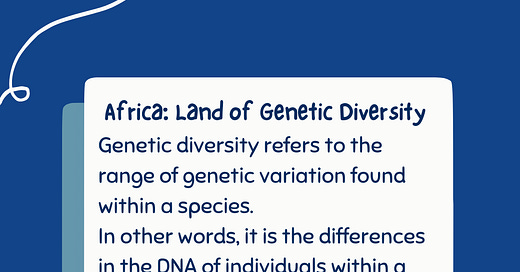Africa is a continent known for its rich cultural diversity, stunning natural beauty, and vast wildlife. But did you know that Africa is also home to incredible genetic diversity? Africa is the birthplace of humanity, and as such, it has the most diverse range of genetic variation found anywhere in the world. In this article, we will explore Africa's genetic diversity and the fascinating implications of this diversity for science and society.
What is Genetic Diversity?
Genetic diversity refers to the range of genetic variation found within a species. In other words, it is the differences in the DNA of individuals within a population. Genetic diversity is crucial for the survival of a species, as it enables adaptation to changing environments, disease resistance, and the evolution of new traits.
Africa's genetic diversity is remarkable. African populations are the most diverse globally, with more genetic variation between African populations than between populations from any other continent. This diversity can be attributed to various factors, including the continent's complex history of migration, interbreeding, and adaptation.
Historically, Africa has seen numerous migrations of people and cultures, which have contributed to the continent's genetic diversity. For instance, the Bantu expansion, which began about 5,000 years ago, involved the migration of Bantu-speaking peoples from West Africa into other parts of the continent. The result was the mixing of different genetic lineages, leading to the creation of new and diverse genetic profiles.
Additionally, interbreeding between ancient humans and other hominid species, such as Neanderthals and Denisovans, occurred in Africa. This interbreeding resulted in the incorporation of genetic material from these hominid species into modern humans, leading to further genetic diversity.
Implications of Africa's Genetic Diversity
Africa's genetic diversity has numerous implications for science and society. For example, studying the genetic variation of African populations can help scientists understand the evolution and migration of humans. Furthermore, studying the genetic diversity of African populations can help identify genetic variations that may confer disease resistance, which can be used to develop new treatments for diseases.
Moreover, African genetic diversity challenges the notion of race as a biological construct. Race has historically been used to categorize people based on physical characteristics such as skin color. However, genetic studies have shown that there is more genetic diversity within racial groups than between them. Thus, African genetic diversity highlights the complexity and nuance of human genetic variation, which cannot be simplified to race.
Is Africa’s Genetic Diversity limited to human species?
Africa's genetic diversity is not limited to only human species. Africa is home to a wide range of plant and animal species, and many of these species have high levels of genetic diversity. In fact, some of the world's most genetically diverse species are found in Africa.
For example, Africa is home to thousands of plant species, including many that are used for medicinal purposes. The continent is also home to a diverse range of animal species, including mammals, birds, reptiles, and fish.
It is worth noting, however, that the genetic diversity of many of these non-human species in Africa is threatened by factors such as habitat destruction, climate change, and overhunting. Conservation efforts are therefore crucial to preserve the genetic diversity of these species and maintain the ecological balance of the continent.
Factors contributing to Africa’s Genetic Diversity
Africa's genetic diversity is the result of a combination of factors, including its geographic and ecological diversity, as well as its long history of human evolution and migration.
Geographic and Ecological Diversity: Africa is a vast and diverse continent with a range of geographic features, including mountains, deserts, rainforests, savannas, and coastlines. This diversity of habitats has allowed for the evolution of a wide range of plant and animal species with different adaptations and genetic traits.
Human Evolution and Migration: Africa is considered to be the birthplace of the human species, and the continent has a rich history of human evolution and migration. Over thousands of years, different human populations adapted to different environments and developed unique genetic traits, contributing to the genetic diversity of the continent.
Environmental and Climate Changes: Over the course of history, Africa has experienced significant environmental and climate changes, including ice ages, droughts, and other fluctuations. These changes have influenced the evolution and genetic diversity of different species, as they adapted to changing environments.
Interspecies Interaction: The genetic diversity of different species can also be influenced by their interactions with other species. For example, plants and animals may co-evolve in response to each other's presence, leading to increased genetic diversity.
Overall, Africa's genetic diversity is the result of a complex interplay of biological, ecological, and environmental factors, and has been shaped over millions of years of evolution.
In conclusion, Africa's genetic diversity is an incredible aspect of the continent's cultural and biological heritage. It highlights the continent's rich history and serves as a reminder of the complexity of human genetic variation. As we continue to study and understand the genetic diversity of African populations, we can unlock new insights into human evolution, disease resistance, and the complexities of race.
Thank you for listening to and reading The Eccentric Biochemist. Stay tuned for more.





Quite a read. Arguably the most captivating I have read on African Biodiversity. Let the succeeding article be on the possible applications.
let the ink keep flowing.
This is elegantly written and well presented. It is important that we study the African biodiversity and understand what secrets they hold as these will define the progress that we can make as a continent and perhaps globally as a species.
Our ability to truly grasp and understand the web that is diversity on the African continent will unlock a treasure trove of new information. I hope we do so sooner than later and we go about it equitably and ethically.
Thank you for the great read!